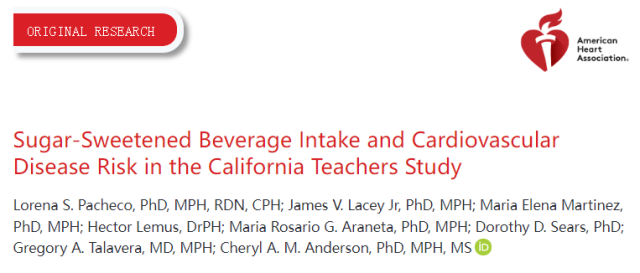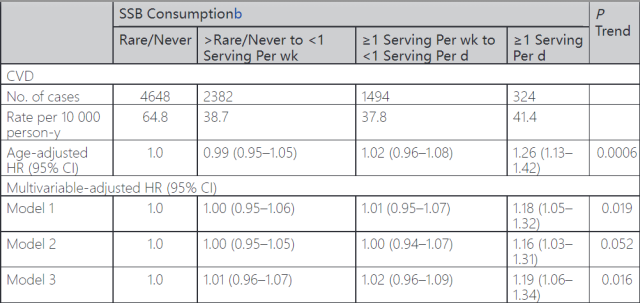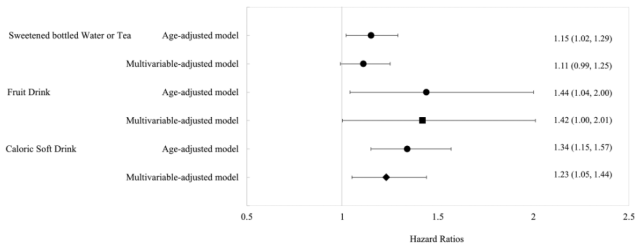One cup of sugary beverage daily increases heart disease risk by 42%
- Normal Liver Cells Found to Promote Cancer Metastasis to the Liver
- Nearly 80% Complete Remission: Breakthrough in ADC Anti-Tumor Treatment
- Vaccination Against Common Diseases May Prevent Dementia!
- New Alzheimer’s Disease (AD) Diagnosis and Staging Criteria
- Breakthrough in Alzheimer’s Disease: New Nasal Spray Halts Cognitive Decline by Targeting Toxic Protein
- Can the Tap Water at the Paris Olympics be Drunk Directly?
One cup of sugary beverage daily increases heart disease risk by 42%
- Should China be held legally responsible for the US’s $18 trillion COVID losses?
- CT Radiation Exposure Linked to Blood Cancer in Children and Adolescents
- FDA has mandated a top-level black box warning for all marketed CAR-T therapies
- Can people with high blood pressure eat peanuts?
- What is the difference between dopamine and dobutamine?
- How long can the patient live after heart stent surgery?
One cup of sugary beverage daily increases heart disease risk by 42%.
Global consumption of sugar- sweetened beverages has been increasing in recent years, along with evidence that high consumption of sugar-sweetened beverages is associated with an increased risk of obesity and related diseases, type 2 diabetes and cardiovascular disease.
An estimated 184,000 deaths globally can be attributed to sugar-sweetened beverages each year, and consumption of sugar-sweetened beverages is also considered to be one of the largest behavioral risk factors for death globally.
Recently, researchers from the University of California published a research paper titled “Sugar-Sweetened Beverage Intake and Cardiovascular Disease Risk in the California Teachers Study” in the ” Journal of the American Heart Association” ” JAHA “.
The study shows that every drink is killing you. Compared with participants who rarely drank sugar-sweetened beverages, one 237-gram sugar-sweetened juice drink per day was associated with a 42% increased risk of cardiovascular disease, and one sugar-sweetened bottled beverage a day was associated with a 19% increased risk of cardiovascular disease and stroke21 % .

For the study, researchers analyzed 106,178 female participants in the United States with an average age of 52, all of whom had no history of cardiovascular disease or diabetes at the start of the study.
There are three types of sugar-sweetened beverages: energy soft drinks, sugar-sweetened bottled drinks, and sugar-sweetened juice drinks.
Divide drinking frequency as rarely or never, less than 1 serving per week, greater than 1 serving per week, to less than 1 serving per day, and greater than 1 serving per day.
Of these, a serving of sugar-sweetened bottled beverages or sugar-sweetened juices is about 237 grams, and a serving of energy drinks is about 355 grams.
Overall, among all participants, 4.3% were everyday consumers of sugar-sweetened bottled beverages, 0.4% were everyday consumers of sugar-sweetened juice drinks, and 3.1% were everyday consumers of caloric soft drinks.
During a mean follow-up period of 20 years, 8848 cardiovascular events, 2677 myocardial infarctions, 2889 revascularization procedures, and 5258 stroke events were recorded.
After adjusting for risk factors, the study found a significant positive association between sugar-sweetened beverage intake and cardiovascular disease.
Specifically, those who consumed sugar-sweetened beverages on a daily basis had a 19 percent higher risk of cardiovascular disease, a 26 percent higher risk of first-time revascularization surgery, and a 21 percent higher risk of stroke than those who drank sugar-sweetened beverages infrequently .

The study on classifying sugar-sweetened beverages found that those who drank more than 1 serving of sugar-sweetened fruit juice drinks (237 grams) per day had a 42% increased risk of cardiovascular disease compared with participants who drank less than 1 serving of sugar-sweetened beverages per day People with caloric soft drinks (355 grams) had a 23% increased risk of cardiovascular disease .

Relationship between different types of sugar-sweetened beverages and CVD
The researchers suggest that sugar-sweetened beverages may affect cardiovascular disease risk through multiple biological mechanisms.
For example, sugar increases blood glucose levels and insulin concentrations, which in turn increase appetite and lead to obesity, and this chain of events can affect metabolism and Cardiovascular diseases.
In addition, too much sugar in the blood is associated with oxidative stress and inflammation, insulin resistance, unhealthy cholesterol profiles, and type 2 diabetes, which are closely related to the development of atherosclerosis, the slow narrowing of arteries that is responsible for most cardiovascular diseases The basics.
Nonetheless, the researchers emphasized that because the study was observational, it only showed an association between regular consumption of sugar-sweetened beverages and cardiovascular disease, and did not suggest a cause-and-effect relationship.
According to the American Heart Association, women should limit their total sugar intake from food or beverages to less than 25 grams per day and men should consume less than 38 grams per day. However, we are still far from this goal.
In addition, sugar-sweetened beverages can increase cancer risk .
In July 2019, researchers from France ‘s Thirteenth University published a research paper titled “Sugary drink consumption and risk of cancer: results from NutriNet-Santé prospective cohort” in the top medical journal ” BMJ “.
Studies have shown that drinking 100ml of sugar-sweetened beverages a day can increase the overall risk of cancer by 18% and the risk of breast cancer by 23%.
The intake of sugar-sweetened beverages is positively correlated with the overall risk of cancer, and fruit juice is no exception .

In June 2022, researchers at Harvard Medical School and the University of South Carolina published a study at the American Academy of Nutrition Flagship Annual Meeting analyzing the relationship between sugar-sweetened beverages and liver cancer.
Studies have shown that women who drank 1 or more sugar-sweetened beverages a day had a 78% higher risk of liver cancer compared to those who never drank sugar-sweetened beverages or drank less than 3 glasses per month (355ml per glass) .
Replacing sugar-sweetened beverages with water, unsweetened coffee, and tea can significantly reduce the risk of liver cancer.
Taken together, sugar-sweetened beverages are potentially modifiable risk factors for many diseases, all of which suggest that sugar-sweetened beverages have no nutritional value and contribute to overweight and obesity and some associated chronic diseases.
Paper link:
https://doi.org/10.1161/JAHA.119.014883
https://doi.org/10.1136/bmj.l2408
One cup of sugary beverage daily increases heart disease risk by 42%
(source:internet, reference only)
Disclaimer of medicaltrend.org
Important Note: The information provided is for informational purposes only and should not be considered as medical advice.



